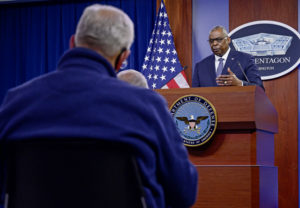
The pandemic has imposed unusual hardships on the military, and Secretary of Defense Lloyd J. Austin III is taking immediate steps to alleviate the worst effects.
Austin announced the moves he’s taking to strengthen economic security in the armed forces. He spoke during a Pentagon news conference today.
“The pandemic and tight housing markets across the country have made financial struggles (for service members and their families) even tougher,” Austin said. “With the holidays approaching, I know that this is on the minds of our military communities. And it’s certainly top of mind for me.”
The challenges service members face include food insecurity, extended wait times for housing, drastically reduced housing inventories and sudden, sharp increases in rental or purchase costs for housing.
A memo from Austin outlined some immediate steps the DOD will take. “The Department of Defense has temporarily raised the basic allowance for housing in areas that have had a 10% increase in rental costs this year,” he said. “And in places with housing shortages, we are extending temporary lodging expense reimbursements so that families have more time to find a home that fits their needs.
“And when it comes to making sure our people have enough to eat, we’ve created a new toolkit that will help leaders identify service members who are struggling and connect service members and their families to resources and support programs and more,” he continued.
The toolkit will be on Military OneSource in a new “Military Leader’s Economic Security Toolkit.” Part of the kit will help leaders identify service members struggling to feed themselves and their families and connect service members to additional resources and support programs to alleviate food insecurity.
This is only the start, Austin noted. He also tasked the undersecretary of defense for personnel and readiness to provide a strategy and “implementation roadmap” for strengthening food security in the force within 90 days.
“The steps outlined in today’s memo won’t solve all the economic worries that our military families face. But they are important steps, and we’re committed to getting this right,” the secretary said. “Men and women in uniform and their families have enough to worry about — basic necessities like food and housing shouldn’t be among them. This is a readiness issue. And that’s why I’m focused on making sure that our service members and their families have what they need to thrive, so that they can focus on the hard work of defending our nation.”


